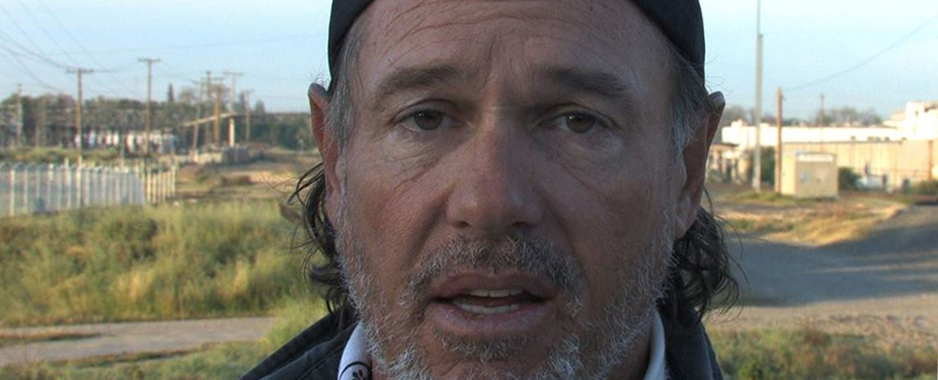
Meet Charlotte, Eddie Pepitone’s new terrier. Plus Bruce Fine and Karen Simmons.
Please subscribe to our show on iTunes and Stitcher, leave a review and share us with a friend.

Meet Charlotte, Eddie Pepitone’s new terrier. Plus Bruce Fine and Karen Simmons.
Please subscribe to our show on iTunes and Stitcher, leave a review and share us with a friend.

Director of the new documentary revealing the homeless plight in America, “Searching For Safe Ground,” which debuts at this year’s Action On Film International Film Festival in Monrovia California on August 22nd. Similar to Steinbeck’s “Grapes Of Wrath,” the touching film “Searching For Safe Ground” directed by filmmaker Costa Mantis, chronicles the struggles of a small group of homeless people in Sacramento, California, who fight for their right for a place to sleep while America and the rest of the world swirl in the strife of the new Great Recession.
In “Searching For Safe Ground” you will meet these homeless people, citizens just like you and me – sisters, brothers, mothers, fathers, families – who lost their jobs and homes and must try to rebuild their lives from backpacks, rolling carts and tents.
“Searching For Safe Ground” challenges the homeless stereotypes and follows John, their leader, as he guides this group of homeless citizens from the ruins of tent city into their battle for the fundamental right to protect and shelter themselves after losing their homes.
Please subscribe to our show on iTunes and Stitcher, leave a review and share us with a friend.
“Give me your tired, your poor
your huddled masses yearning to breathe free…
Send these, the homeless, tempest-tost to me,
I lift my lamp beside the golden door.”
-Emma Lazarus 1883, engraved on the Statue of Liberty
by Blair Hickman and Christie Thompson ProPublica, Aug. 9, 2013, 9 a.m.
In 1994, Bridget O’Connor began an internship at Rockland Psychiatric Center, where one of the doctors allegedly began to refer to her as Miss Sexual Harassment, told her that she should participate in an orgy, and suggested that she remove her clothing before meeting with him. Other women in the office made similar claims.
Yet when O’Connor filed a lawsuit, her sexual harassment claims were dismissed because she was an unpaid intern. A federal appeals court affirmed the decision to throw out the claim.
Unpaid interns miss out on wages and employment benefits, but they can also find themselves in “legal limbo” when it comes to civil rights, according to law professor and intern labor rights advocate David Yamada. The O’Connor decision (the leading ruling on the matter, according to Yamada) held that because they don’t get a paycheck, unpaid interns are not “employees” under the Civil Rights Act — and thus, they’re not protected.
Federal policies echo court rulings. The laws enforced by the U.S. Equal Employment Opportunity Commission, including the Civil Rights Act, don’t cover interns unless they receive “significant remuneration,” according to commission spokesperson Joseph Olivares.
“At least with respect to the federal law that we enforce, an unpaid intern would not be legally protected by our laws prohibiting sexual harassment,” Olivares said in an email to ProPublica.
It’s unclear how many interns are sexually harassed at work. The commission doesn’t keep those statistics, according to Olivares. And as the Chicago Tribune detailed in 2011, interns often don’t know where to turn when faced with harassment or can fear retaliation from bosses they look to for future jobs or recommendations.
“You can understand perhaps why there haven’t been more cases,” said Yamada. “If you’re a young student, and have been trying to get a career off the ground, the bind that puts someone in is significant, because there’s retaliation.”
Olivares noted that while federal laws don’t protect unpaid interns, company policies and state or local laws could sometimes broaden workplace protections.
In June, Oregon passed a law expanding discrimination and harassment protections to interns, whether they are paid or not. According to Charlie Burr, spokespersonfor the state’s Bureau of Labor and Industries, Oregon is the first state to pass such protections.
“Those principles of protecting people in the workplace have been in place for a long time, but they’ve never applied to interns,” said Oregon Labor Commissioner Brad Avakian. “It really left them with few options.”
Oregon’s law protects interns from sexual harassment and discrimination based on race, religion, gender, disability, and sexual orientation and covers wrongful termination tied to discrimination 2014 but it doesn’t create an employment relationship or impact wages, an issue the state was careful to avoid, according to Avakian.
The idea for the law came from Carole Delogu, a former unpaid intern in the state’s Bureau of Labor and Industries, after she read an article in the Public Interest Law Journal on the workplace protections not afforded to interns.
“I was in disbelief,” Delogu said, of her reaction to the loophole. “Interns are in a fragile place, they want to get their foot in the door, so they don’t complain.”
So Delogu brought her concerns to the Labor bureau, and helped draft a proposal to close the gap in protections. Under the new law, Delogu hopes “more people will be able to stand up for their rights.”
D.C. has made similar strides to protect interns. Council member Mary Cheh lobbied successfully to extend the D.C. Human Rights Act protections against sexual harassment to interns after hearing the story of one intern’s sexual harassment claims against her employer, a massage and body therapy center in Friendship Heights. The intern’s case was dismissed because she was unpaid.
Yet as Maurice Pianko, attorney and founder of Intern Justice, points out: if for-profit employers paid their interns when they should (and usually they should be paid), protection from discrimination and sexual harassment would automatically apply.
“It’s a surprise to me to see that there are still companies not paying their employees,” Pianko said. “If any general counsel wants to find out the law they can, and honestly I don’t know what they’re thinking.”
by Blair Hickman ProPublica, Aug. 2, 2013, 3:18 p.m.
This story has been updated.
Starting in the fall of 2013, interns at the Nation Institute will be paid minimum wage for the first time in the history of the 30-year-old program 2014 a decision that was spurred on by none other than the organization’s own interns.
“We want internships to provide workers a living wage for an honest day’s work,” former Nation intern Alleen Brown told ProPublica. “Our experiences may be very different from workers in a fast food restaurant, for example, but we share a common goal: we just want a dignified life.”
Brown was part of a group of 12 interns that published a letter to the editor in the latest issue of The Nation, presenting a case for higher pay. At that point, Nation interns worked full-time for a $150 weekly stipend, “an impossible prospect for many who are underrepresented in today’s media,” the interns wrote.
Nation Institute director Taya Kitman responded in the same issue, saying the Institute “appreciate[d] this thoughtful letter” and “has determined to increase their stipend beginning with the fall 2013 class.”
Yesterday, the Nation Institute confirmed in a tweet that it would begin paying interns the minimum wage in the fall of 2013 2014 a rate that the Nation’s own business writer has said is “not enough to make rent in any state.”
According to Kitman’s letter, the Nation Institute will also “continue to provide financial aid in the form of travel and housing grants to interns.”
“We see this as the beginning, not the end, of this conversation,” said Kitman in a statement, which also noted that the effort to increase intern pay began in the fall of 2012. “We hope that in the future we will be able to raise additional money, allowing us to pay our interns more.”
Brown, who is now a freelancer in Minnesota, said she hoped the Nation internship would help her parlay her journalism degree into full-time work in media. She said she survived on the stipend, savings from service industry work and credit.
“The stipend probably paid for food for a week, and then I used credit to pay rent,” Brown said. “Now the card is not quite maxed out, but I accrued a lot of debt.”
Brown said she was very pleased with her Nation internship, and the internship director’s support. But she’s still searching for full-time work.
“I was optimistic, but conscious of the fact that I’d probably have to come back to Minneapolis for a while and recuperate,” Brown said. “I like to go with the lifeline angle. I used my lifeline, and now to go back to New York, I need to get a new one. I need to save up some money.”
The Nation’s Spring 2013 interns hope other interns in publishing and other industries are encouraged to stand up for their own right to fair pay, according to Brown. They’ve launched a website with their letter, the Nation’s response and a space for other interns to share their stories.
We have reached out to Kitman for more details on the Nation’s new internship policy, and will update this post as soon as we get them.
Update: August 2, 2013, 5:25 PM: Kitman has gotten back to us. In response to our question on whether higher pay means there will be fewer interns in Fall 2013, she says:
We are using the renaming of the internship program as an opportunity to restructure. Rather than having web interns and print interns, as we do now, we’re merging those positions. Nation interns will research and fact-check for the magazine, in addition to assisting with daily web projects on TheNation.com. Not only will this provide interns with a more diverse range of skills, we believe this reflects the increasingly integrated nature of print and web journalism, in general and in The Nation’s newsroom. We are not yet certain how this will work out longterm but for the fall we are anticipating hiring ten interns rather than twelve. If we need more interns, we will revisit for the spring and hire accordingly.
Kitman also clarified that the financial aid to interns has been coming in the form of six to eight grants per year. Each grant averages five hundred dollars, and is need-based.
Do you have an internship story to tell? ProPublica is also collecting stories from current and former interns, those who couldn’t afford unpaid internships, as well as employers and internship coordinators.
A lot going on between Russia and America since Edward Snowden was granted political asylum by Moscow. For a clear understanding of what’s going on in Russia and how it effects America we turned to Alec Luhn who covers Russia for The Nation Magazine. Here’s his latest article in The Nation….
Divisive as he may be, Navalny’s mayoral campaign will be seen as a test of the opposition movement, which has faced diminished turnouts at rallies and persecution of allied duma deputies. Sobyanin himself has been insistent that Navalny run, seemingly eager to beat him and discredit the viability of the non-system politics he represents. If he can unify enough voters behind him to exceed expectations, though, Navalny can prove the vitality of the opposition and show that he’s not just a great blogger and rabble-rouser, but also a good politician.
via Despite His Politicized Trial, Aleksei Navalny Is Still a Divisive Figure in Russia | The Nation.

Just when you thought it was impossible to hate Big Banks any more than you could, now we can blame the rising cost of beer on Goldman Sachs. Since the beginning of the Great Recession, the Federal Reserve has lent money to banks at about near zero interest rates hoping these banks would stimulate the economy by lending that money to small businesses or Americans trying to buy a home. But this week we learn the banks are using this cheap money to buy up commodities like aluminum and energy driving up prices, making a fortune while making it harder for the rest of the world to do business. For more on this Deputy Economic Policy Editor for Think Progress Alan Pyke joins us.
Please subscribe to our show on iTunes and Stitcher, leave a review and share us with a friend.